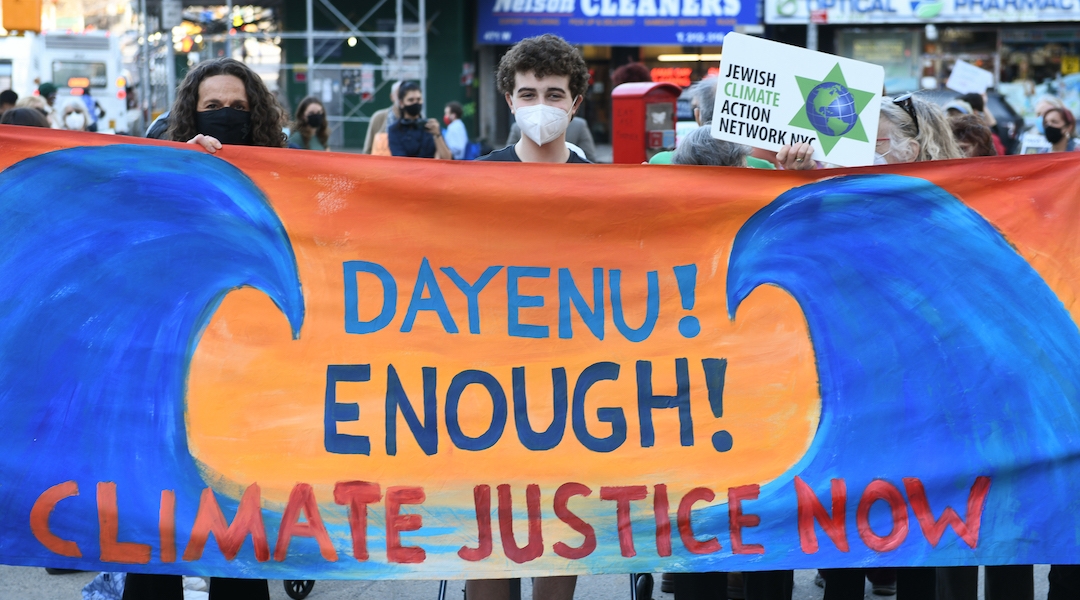In a first, Oregon’s Jewish federations pull investments from fossil fuels
Federation leaders concluded that fossil fuel divestment aligned with their financial goals as well as their values

Dayenu CEO Jennie Rosenn holds up a banner after addressing the crowd at a rally urging New York State lawmakers to pass the Climate and Community Investment Act in New York, April 7, 2021. (Gili Getz / Courtesy of Dayenu)
(JTA) — Oregon’s two Jewish communal federations have decided to divest their endowment funds from the fossil fuel industry due to concerns about the ongoing impact of the climate crisis.
The announcement on Wednesday makes the Jewish Federation of Greater Portland and the Jewish Federation of Lane County, which together represent approximately 60,000 Jews, the first of the 146 Jewish federations across North America to pull their investments from oil, gas and coal companies. They have more than $3 million in investment assets.
Even as many Jewish groups actively support climate action and engage in advocacy on the issue, only a handful of Jewish organizations have ever announced fossil fuel divestments. Dayenu, a Jewish climate advocacy group that released the announcement on behalf of the federations, has been encouraging Jewish groups to embrace divestment as a tactic that can help accelerate a global transition toward clean energy.
“Oregon’s two Jewish Federations are leading the way, taking this common-sense approach to aligning their investments with their values and taking meaningful action on climate,” Dayenu CEO Jennie Rosenn said in a statement. “They are the first of what we are confident will be many Jewish communal institutions to follow.”
More than 1,600 institutions and organizations around the world have made full or partial climate investment pledges, including hundreds of faith-based groups, according to a public database that tracks pledges. Before the new announcement, only three Jewish groups were among that tally: the Reform movement’s pension system; the American Jewish World Service, a global service and aid group; and Kolot Chayeinu, a congregation in the Brooklyn, New York, neighborhood of Park Slope.
The Portland Jewish federation concluded that fossil fuel divestment aligned with its financial goals as well as its values, according to Hank Kaplan, a federation board member.
“In addition to being the main driver of the climate crisis, fossil fuels are a declining industry and have underperformed the rest of the market over the past decade,” Kaplan said in a statement. “Screening out fossil fuels aligned with our values and our history of climate action and made plain financial sense.”
Dayenu began advocating divestment after calculating in 2022 that the endowments of Jewish communal organizations had at least $3 billion tied up in oil, gas or coal companies. Dayenu’s initiative came as another Jewish group involved in environmental advocacy, Adamah, organized a new green coalition of Jewish institutions interested in climate action.
By early 2023, these efforts, supported by donors such as the Diane and Guilford Glazer Foundation, put climate at the top of the agenda of the Jewish communal world for the first time.
The two Oregon federations don’t directly manage their own investment dollars. Instead, they hold accounts with the Oregon Jewish Community Foundation, a donor-advised fund that directs investments and makes grants on behalf of donors. The federations made their climate-friendly investment change by opting to use a fossil-fuel-free pool offered by the foundation.
Several other donor-advised funds, or DAFs, serving Jewish communities across the country offer fossil-fuel-free options, but the exact number is unknown, said Jacob Siegel, Dayenu’s climate finance advisor, who added that he has “had conversations” with Jewish DAFs that “either offer fossil-fuel-free investing options or are in process to create such an option.”
Siegel said that if donors request fossil fuel-free options from the organizations housing their philanthropic capital, it could persuade more DAFs to offer that choice.
“The goal is not just about the dollars represented,” he said, “but about changing the market signals more generally.”
This article originally appeared on JTA.org.
A message from our CEO & publisher Rachel Fishman Feddersen
I hope you appreciated this article. Before you go, I’d like to ask you to please support the Forward’s award-winning, nonprofit journalism during this critical time.
We’ve set a goal to raise $260,000 by December 31. That’s an ambitious goal, but one that will give us the resources we need to invest in the high quality news, opinion, analysis and cultural coverage that isn’t available anywhere else.
If you feel inspired to make an impact, now is the time to give something back. Join us as a member at your most generous level.
— Rachel Fishman Feddersen, Publisher and CEO